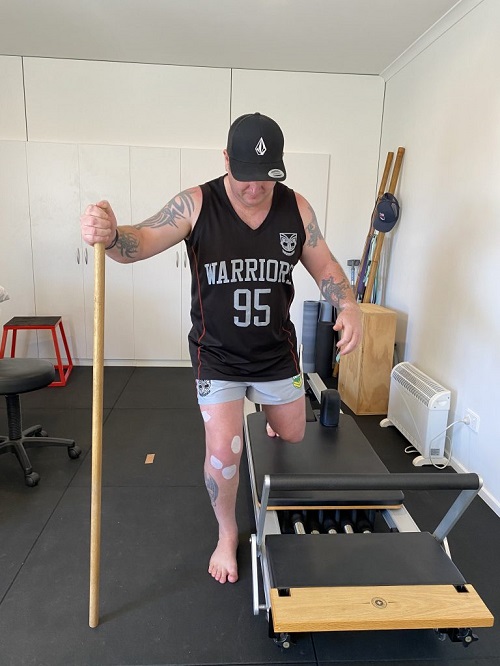ACL
Anterior Cruciate Ligament
Why Anterior Cruciate Ligament (ACL) injuries are the worst injury for skiers of Wanaka?
ACL tears is one of the common major injuries we see in skiers. We’re not going to beat around the bush here, the rehab is long and hard. Most people will continue rehab for 12-18 months after surgery and surgery only happens 4-6 months after you tear it and have done some solid strength work pre-op. This means you will be off the slopes for the rest of this season and quite possibly next. Why is the ACL so important? The ACL is one of the main stabilising ligament in your knee. It is deep in the knee and crosses with the Posterior Cruciate Ligament (PCL). Ligaments are strong and fibrous and limits excessive twisting movement in the knee. The two other ligaments that help stabilise the knee are the MCL on the inside and LCL on the outside of the knee.
We are the experts in getting you into the gym, staying motivated and on track to be back on the slopes as soon as is safe to do so.
How to know if you’ve done your ACL?
ACL’s are commonly torn by a twisting or a hyperextension movement at the knee.
You often hear or feel a pop.
There is usually a significant amount of swelling but it may take 24 hours to get to its peak.
Your knee feels unstable.
We carry out specific tests on your knee to check the integrity of the ligament. You can see one in our video. If we suspect a grade 2 (partial) or 3 (full) tear we will refer you to a specialist to get an MRI.
ACL tears unfortunately don’t often happen in isolation. The “terrible triad” is when people tear their ACL, Medial Collateral Ligament (MCL) and medial meniscus. We test for all of these injuries at the initial assessment.
How to treat an ACL injury?
There are two main pathways – conservative or surgery. There is more emerging evidence that conservative or non-operative management is more appropriate for some people. ACL tears are often not done just in isolation and people will often tear their MCL or meniscus at the same time. We will always refer you to a specialist knee Orthopaedic Surgeon to ensure you get all the information before making a decision.
Whatever path you choose to take we will give you the skills and the information to make the appropriate choice for your lifestyle
What will my rehab journey look like?
At Alpine Physiotherapy a typical journey for most people would be first to see us. We would do all the special knee tests to see how much the ACL has torn (grades 1-3), assess for other injuries such as MCL or meniscal tears. Everyone who comes to our clinic will do start quality rehabilitation in that initial appointment.
In that session we will refer you for an x-ray and an MRI through the ECP (Escalated Care Pathway). X-rays will happen that day to check for tibial plateau or other fracutres and an MRI scan often take a few weeks to get organised. We have such a close relationship with knee surgeons can refer you directly for an Orthopaedic review and an MRI. It is much quicker than traditional GP route.
Most of the surgeons we use will come to either Wanaka or Queenstown for a clinic every month or so. However ACC will also be able to fly you to Christchurch or Auckland to see them if you wish.
Once you have done at least 4 months of good quality rehab, have had all your scans and have had a surgical review then you will go on one of two paths. Either go onto have surgery or if you are managing well will continue on without surgery. If you opt not to have surgery you will still be reviewed by the surgeon for at least 6 months and can always opt for surgery at a later date.
But what if you want surgery ASAP? Both your physio and your surgeon will advocate for several months of strengthening first. You reduce your risk of arthritis and will make your rehab journey more effective in the long run.
Rehab will then take most people 12-18 months to get back to all the fun twisting and turning sports we love. Just remember pro athletes will take a minimum 9 months to return to sport and they have a full time physiotherapist, strength and conditioning coach and they train twice a day!
How can physiotherapy prevent ACL injuries?
Prevention is the best medicine!
Physiotherapists can provide a strength and plyometric training programme specific to you and your sport. This has repeatedly been proven to reduce your injury risk by huge amounts. Webster and Hewett 2018 did a study on knee injuries in soccer and showed that injury prevention programmes reduce non-contact lower limb injuries by 67%!
Skiing specific knee injury prevention exercises can be found by joining our free facebook group SKI FIT WANAKA. Netball NZ released their programme Netball Smart early 2021, FIFA 11+ has repeatedly proven to be effective at reducing knee injuries in Soccer. FIFA 11+ Kids is a perfect one to get the 8-11 year olds started.
How much will it cost?
FREE under ECP as long as you meet all the criteria. We have secured extra funding from ACC as we see so many people with ACL injuries. Other clinics who have not got extra funding from ACC will charge upward of $5k over the 12 months. ACC will also fund your surgery if you wish to go down that path and all of your specialist appointments.
Email us to see if you qualify for fully funded physio admin@alpinephysiotherapy.co.nz.
